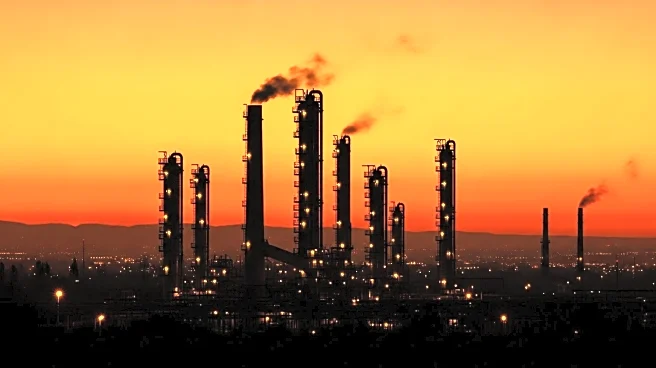What's Happening?
A significant fire erupted at the Chevron oil refinery in El Segundo, near Los Angeles, on Thursday night. The blaze, which began around 9:30 p.m., sent large flames and smoke into the sky, visible for miles. Despite the dramatic scene, no injuries were reported, and all personnel were accounted for. The fire was contained by early Friday, with no threat to public safety, and no evacuations were ordered. The fire is believed to have originated from an isolation unit within the refinery. Local authorities, including the El Segundo Police Department and LA County Fire Department, responded promptly to manage the situation. A shelter-in-place order was briefly issued for nearby Manhattan Beach but was lifted by Friday. The cause of the fire remains under investigation.
Why It's Important?
The fire at the Chevron refinery could have implications for fuel prices in California, which already has the highest gas prices in the nation. The refinery is a major facility, capable of refining up to 290,000 barrels of crude oil per day, including gasoline, jet, and diesel fuels. Any disruption in its operations could affect supply and pricing. The incident highlights the vulnerability of critical infrastructure and the potential economic impact of such events. While no immediate air pollution issues were detected, the situation underscores the importance of disaster preparedness and response in industrial areas.
What's Next?
Authorities are investigating the cause of the fire and assessing its impact on refinery operations. The California Energy Commission has been contacted for comments on potential consumer impacts. Governor Newsom's office is coordinating with local and state agencies to ensure public safety and protect the surrounding community. The refinery's operations and any changes in fuel prices will be closely monitored in the coming days. Stakeholders, including local businesses and residents, will be watching for updates on the situation and any potential economic repercussions.
Beyond the Headlines
The incident at the Chevron refinery raises broader questions about the safety and environmental impact of oil refining operations. It highlights the need for stringent safety protocols and effective emergency response strategies to mitigate risks. The event also brings attention to the reliance on fossil fuels and the ongoing debate about transitioning to renewable energy sources. As California continues to lead in environmental initiatives, incidents like this may influence policy discussions on energy production and sustainability.











